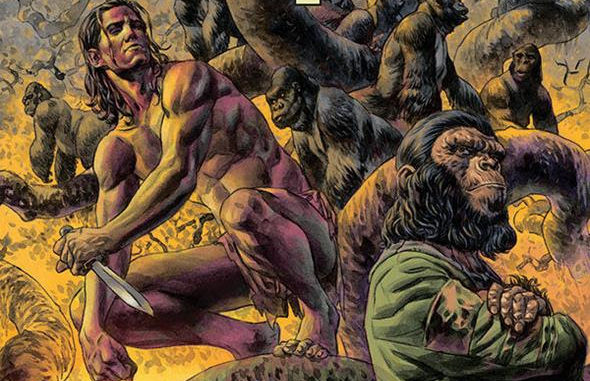
There have been a myriad of film and television reworkings of Tarzan as well as ‘Planet of the Apes.’ At its core author Edgar Rice Burroughs’ books on Tarzan were adventure stories. In the original story Tarzan is brought up by a tribe of apes in Africa at the turn of the 20th century. Tarzan finds out who he really is, rejects the standards of English society and returns to a fictional Africa where he has many adventures. Through these series of novels he is always the savior and protector of his adopted ape tribe. His life is simple and straightforward. On the other hand, ‘Planet of the Apes’ the original French science fiction novel by Pierre Boulle discusses class systems, among other ideas that challenge the way we live our lives. There are also some significant differences to the 1968 film starring Charlton Heston. It is the movie that people remember the most with its complex, multi-textured narrative that forces you to think about our humanity and the ceaseless cycle war can create.
Two brothers of the Mangani stare pensively from off a comic book cover. One is perched on a tree limb, the other standing tall. Guess which one is standing? It is Milo, the chimpanzee son of Zira and Cornelius, the other is Tarzan. They like this narrative by David Walker and Tim Seeley complements each other spectacularly. Based on two iconic franchises ‘Tarzan on the Planet of the Apes’ gives the reader much to think about. Threats to this tribe of apes headed by time travelers Zira and Cornelius are coming from everywhere at once. Their white-skinned son is kidnapped, apes and people die and Milo takes on the mantle of Caesar. At this point you would think that things couldn’t get any worse. Of course, they do. When we meet Tarzan years later he is still climbing trees. Living with his scheming cousin he longs to return home. Meanwhile, Walker and Steeley have created something so engrossing that you’re left holding your breath the entire time.
For Tarzan, he sees humanity as a group that is constantly subjugating. It is out of fear. And a war is raging that won’t end unless everyone is dead. In the second film installment of ‘Planet of the Apes’ humans who live underground have a nuclear device. It has been said that it was a way of killing the franchise. But like the three films after that, the reprinted issues of this comic book miniseries makes a strong comment on the destruction endless violence causes. War won’t end unless an alternative is chosen. Though this message is a strong undercurrent, you are not hit over the head with it. Instead what you have is a well-written adventure story with parallel timelines, spaceships and telepathic, prehistoric creatures.
Adapting well-known stories from literature can be tricky. Films have failed miserably and television series have been short-lived. However in comic book form this version endures. Walker and Steeley like professional tightrope walkers have made their way through the fine line between giving respect to the resource material and making their own mark. Telling a good story will do that.

Leave a Reply